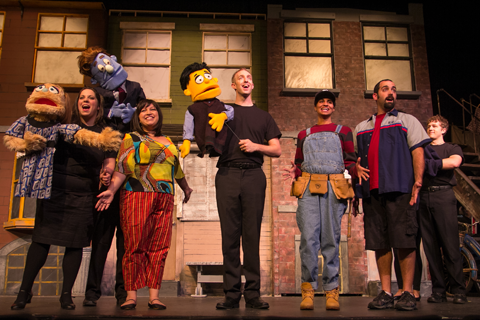 WHO YOU CALLIN' A GROUCH? Avenue Q has some fun with modern young adult ennui.
|
One of the risks of being raised on PBS children’s programming, apparently, is the realization that one is not as special or as destined for greatness, in the grown-up world, as Big Bird seemed to let on. That’s the conceit, anyway, in the coming-of-age puppet musical about an earnest recent grad, who looks very like he came out of (but has in no way been authorized or approved by) the Jim Henson Creature Shop. His neighborhood in the real world has a different ethos than that of Sesame Street, in the cheerily sarcastic, profanity-ridden satire Avenue Q. The 2003 Tony Award-winning play is on stage now in an energetic community theater production at Lyric Music Theater, directed by Jonathan R. Carr.
Young Princeton (sweetly ingenuous Joel Crowley) takes his B.A. in English and moves to a run-down, outer-borough neighborhood on Avenue Q, with its laconic stew of underemployment and twenty-something ennui. His new neighbors burst frequently into song, but the upbeat tempos and major keys are usually ironic. “Why you all so happy?” asks his neighbor Christmas Eve (Alison Bogannan, playing up her character’s Asian-American syntactical tropes) suspiciously, when she walks into the middle of the first musical number. It’s only because they’re competing, in song, about whose life most sucks.
Princeton’s thwarted neighbors include sadly single kindergarten aide Kate Monster (Molly Harmon); out-of-work stand-up comic Brian (Dave Ciampa), boyfriend of Christmas Eve; uptight, closeted Rod (Torin Peterson), who’s in love with his straight roommate Nicky (Shawn Reardon); the porn-addicted monster Trekkie (Owen White); and a post-career, butt-of-many-jokes Gary Coleman (Olivia Orr, neither short nor male), who is the building superintendent. In the fashion of Friends or The Real World, Princeton’s neighbors help each other out, kick each other out, and have full-on puppet sex in a variety of positions. In the fashion of Sesame Street, they are regularly edified by tongue-in-cheek animations, which define salient vocabulary words such as “purpose.”
All characters but Brian, Christmas Eve, and Gary are puppets, which their actor-puppeteers work in full view. This allows the actors’ human facial expressions to elaborate on the puppets’ emotional life: Crowley and Harmon work their Princeton and Molly on the subtler end, with bright, innocent smiles, while Peterson gets pretty histrionic giving tortured face to his Rod. Voices are strong, and everyone manipulates their brightly-colored rod- or arm-puppets (smartly constructed by Karen Trask) quite capably—Reardon’s Nicky, particularly, has a great careening physicality.
Some of the show’s funnier touches hearken back to the stoner randomness of the old Sesame Street imagery, like a chorus of brown boxes with anxious eyes, or a dream sequence in which a commitment-fearful Princeton runs from a gaggle of bridal veils with outstretched monster paws. When the dangerously adorable Bad Idea Bears succeed in urging someone into excess drinking or drunk sex (in fun work by Doni Tamblyn and Kyle Aarons), they squeal “Yay!” with a delight that more or less mimics the effects of dopamine. Set design (Carr and Ken Hutchins) is nicely conceived—there’s a clever birds-eye set piece of Nicky and Rod in their twin beds—and the block of brick, clapboard, and brownstone row houses itself looks convincingly like a mild cartoon of dereliction.